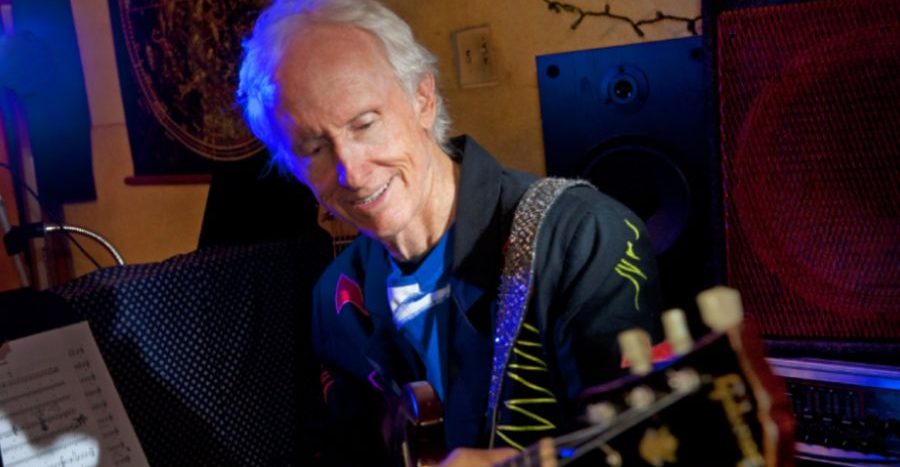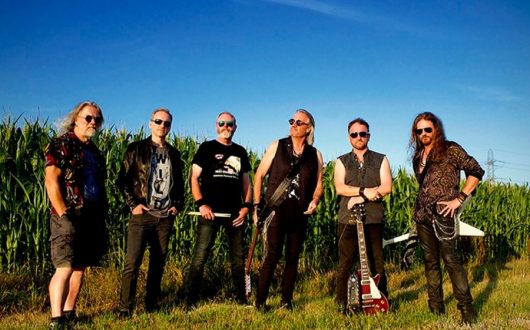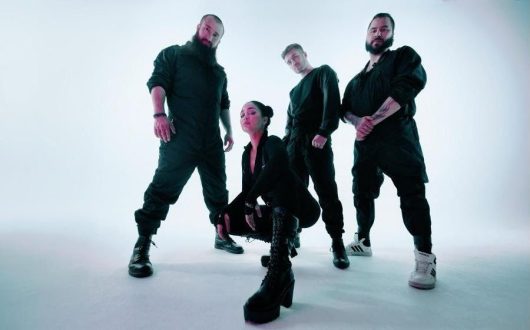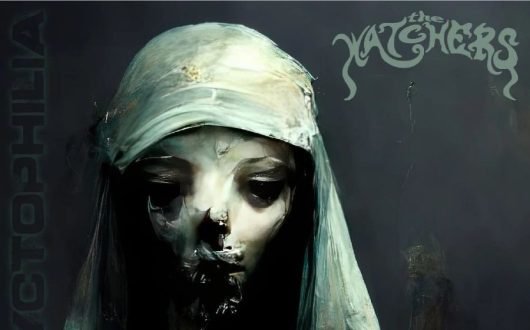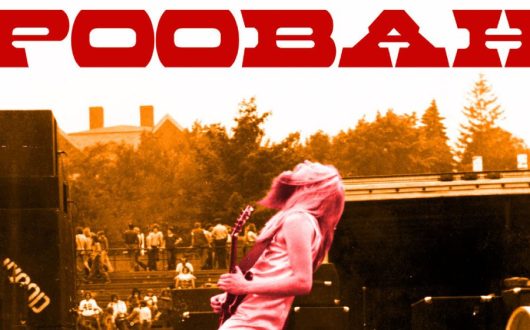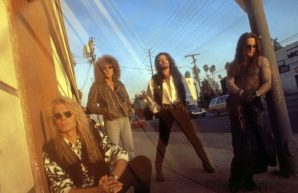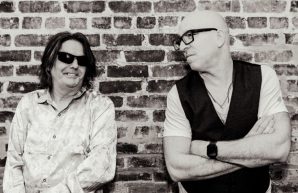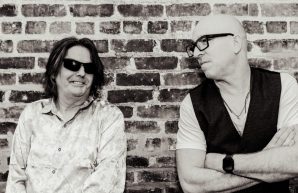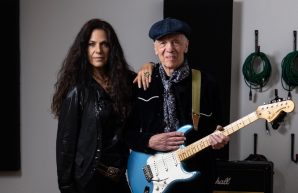Interview by: Mark Lacey
Photo : Jill Jarrett
“Some of my friends were looking for something to do, so we just started jamming together. I was just giddy about playing with them and seeing what would happen, and just doing it for fun. Somebody turned the record button on one day, and it started coming out like an album”.
It’s been almost 60 years since a young Robby Krieger joined the Doors, kickstarting a lifetime’s enduring journey in music. Across his career, he has enjoyed success both in his former band, and latterly as a solo musician, innovating and experimenting with his diverse taste in musical styles. Acknowledgement of his success has come from his countless collaboration requests, recognition from the Rock N Roll Hall of Fame in 1993, as well as other artists covering his songs; most notably ‘Echo & The Bunnymen’ performing ‘People are strange’ for the Lost Boys film soundtrack. His latest project ‘Robby Krieger & The Soul Savages’ sees him performing jazz fusion improvisations alongside a cast of world class musicians; including drummer, Franklin Vanderbilt; bassist, Kevin ‘Brandino’ Brandon; and keys player, Ed Roth.
Franklin and Robby talk to MyGlobalMind.com about how it came together.
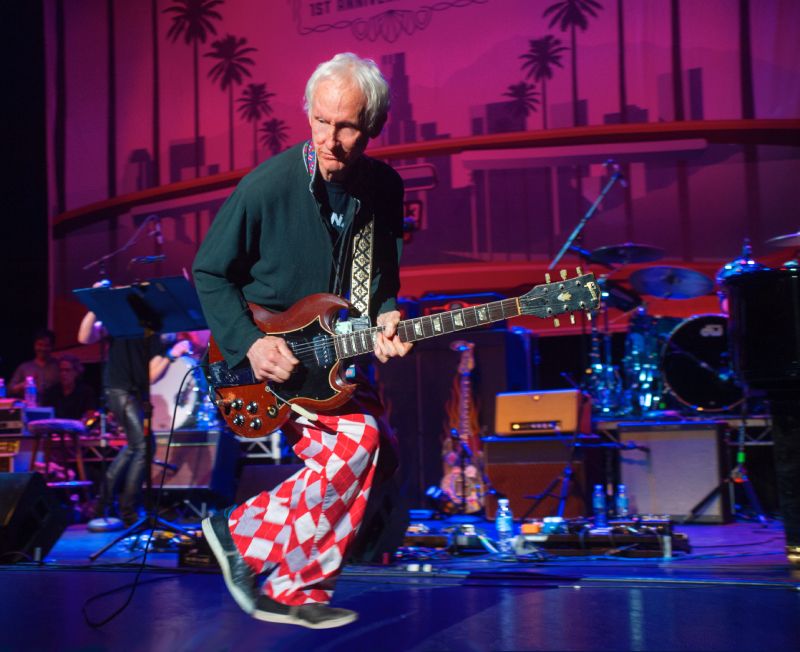
Photo : Jill Jarrett
Robby: That’s funny that the Echo and the Bunnymen version of ‘People are strange’ was in that movie. I just did a show with Echo and the Bunnymen about a month ago; they were part of a big festival down here in LA, and we played ‘People are strange’ together.
MGM: Robby, this album follows on from your 2020 album ‘The Ritual begins at Sundown’, but before that, your solo work has had 10 years in between albums, so this feels like you’re enjoying something of a creative spurt. Would you agree?
Robby: Well, it might have something to do with the pandemic, not having anything to do. I have my studio in Glendale, and some of my friends were looking for something to do, so we just started jamming together, me and Kevin Brandon, and Franklin and Ed Roth. These guys are world class musicians. I was just giddy about playing with them and seeing what would happen, and so we were just doing it for fun. And then somebody turned the record button on one day, and we started recording this stuff, and really it started coming out like an album. It’s just a great way to make a record, just by jamming together. Everybody puts their ideas in; it’s not like four guys calling each other on Zoom with a drum part and this and that. It’s really getting together and playing. I’ve got some great gear at my studio, all the old tubes gear, so it just really sounds good.
MGM: How did you guys all meet in the first place? Have you known each other a long time?
Robby: Well, Kevin and I have known each other quite a while, and Ed and I just met about three, or four years ago. And Franklin, about the same. And you knew those guys longer, right, Franklin?
Franklin: Well, I’ve known Kevin Brandon the longest. I met him in 2004. I met Robby and Ed in the fall of 2019.
MGM: Looks like for some of you this is a bit of a new collaboration. So, what was it that prompted you to start jamming together? Was it really just designed to keep yourselves occupied during that weird COVID time, or did it feel more deliberate than that?
Robby: What actually happened was my friend Kevin Brandon got really sick; he couldn’t get out of bed for a year, and he finally started making some progress. And then at the same time, I got sick. I had melanoma, which the doctor said, well, you might have six months. And then I was lucky enough that my gardener had another client who had the same thing I had, and he did this new treatment, and the thing just went away. It was amazing. So, Kevin and I both got better around the same time. We hadn’t talked to each other for years because we’d had a fight. I won’t go into it, but we hadn’t spoken to each other for maybe five years. We called each other, and we were both great, put it to bed, and wanted to play. I invited him over, and Ed Roth lives right near my studio, so he’d been playing over at the studio quite a bit. We first started playing with a drummer called Dale Alexander, who was from Minneapolis, but he had to go back to Minneapolis, so Franklin came in. I didn’t know Franklin, but Brandino, Kevin Brandon knew him since 2004. And that’s how it started.
Franklin: I met Robby back in October of 2019, and we just started hanging out more often, and then chemistry started to develop, and Robby kept inviting me to different places. And before you know it, we ended up in the studio playing riffs, and we did it all throughout the pandemic. And here we are.
MGM: The album’s got a real mixture of styles on it. There are a lot of jazz, fusion, and psychedelic sounds in there. Did you start writing the music expecting it to sound like that, or is that just the noise that comes out when the four of you get together in a room?
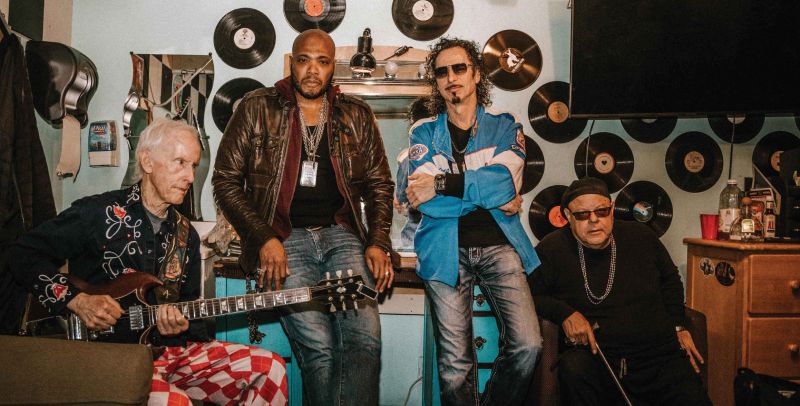
Robby: It’s really the latter. It usually started out with Kevin and Franklin playing some kind of riff and a beat, and then Ed and I would come in and see what we could put in. It’s really a good way to write music, I think, just to start playing and see what comes up. There were a couple of songs that I had in my head before, but most of it was just on the spot.
Franklin: It was very organic.
MGM: When you’re writing music that sounds as improvised and experimental as this does, how do you know when you’ve got the finished version of it that you want to put down onto tape?
Robby: I think the way we did it, we didn’t come up with a version to record. We were recording the whole time, so we’d be recording the whole jam, and then we would come back into the control room and listen and say, OK, that works there. Let’s put that part after this part. And that’s how it worked.
MGM: There’s quite a bit of similarity, Robby, with this album, and maybe some of the albums you did immediately after the Doors, and I’m thinking of ‘Versions’. Was it a deliberate move for you to re-visit that style?
Robby: Well, ‘Versions’ was a little different. The reason I call it that was because it was versions of other people’s songs. I did all kinds of songs, but they were all written by other people, but this was totally different. It was us writing and seeing what we could come up with.
MGM: This album is completely instrumental all the way through. When artists usually come up with the titles for their songs, it’s based around a lyrical idea or a thematic idea, and yet you don’t have lyrics as a focal point. So, how do you come up with a title like ‘Samosas and Kingfishers’?
Robby: Well, we have our studio manager, Marco Moyer, who’s really good at coming up with names, and he would come up with a list of 50 names for each song, and we would have to choose. Ed also is very good at naming things. He came up with the samosas and kingfishers. Kingfishers is the beer that they have in India, and samosas is a food dish that they have over there. So that made sense because the song was kind of based on the Ravi Shankar kind of lick.
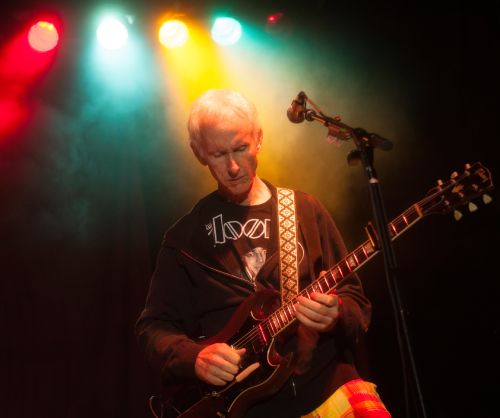
Photo : Jill Jarrett
MGM: You’ve also got a song on there called Bouncy Betty, and I wondered who or what that might have been inspired by. Who’s Bouncy Betty?
Franklin: All right. Well, Bouncy Betty was inspired by a curvaceous, beautiful woman. I thought about visuals that I had in mind from the past and the present. And so that’s the groove that I came up with. It was inspired by curvaceous women.
Robby: We ought to make a video on that one, for sure.
MGM: ‘Kill Zone’ is one of the album’s highlights, and features some remarkable interplay between the keyboards and the guitar. What was going through your mind as you were putting that one together?
Franklin: I came up with the groove and Brandino was searching for a couple of different options, and then he just stuck with the one that you’re hearing on the album now.
Robby: It’s a diminished scale that he uses. And after that, Ed Roth came up with this crazy melody thing that he does. And then I would answer the melody, so the melody keeps coming back, and then I would answer it every time differently. That’s one of our favourites, too.
MGM: You’ve spoken about the opportunity to tour this album, and you did a show as ‘Robby & The Soul Savages’ during the Xmas holiday at the Write Off Room in Studio City. You’ve also previously played quite a few of the songs from this album as far back as September, at the Oceanview Pavilion. So, this line-up have already been performing together on the live circuit?
Robby: We’ve actually played quite a few gigs around town here, around LA, over the past couple of years, and so we’re hoping to take it outside of LA and maybe even come to England. I think the first gig we played was the Seven Grand Club a couple of years ago.
Franklin: I think more than a couple of years ago now. We just started getting together in the studio, and I would show up wherever Robbie was and sit in and play, and everything kind of fell together. But I believe some of our first gigs were at the Seven Grand, and Bogies, if I’m not mistaken. That’s how it all started.
MGM: This kind of music, I think, has got a natural home in those jazz clubs across America. But if you were to bring it to the UK or to Europe, would you look to play the likes of Ronnie Scott’s or the Jazz café? Or would you hope to go bigger than that?
Franklin: I feel both. But I have a goal for Robby Krieger & The Soul Savages. I would love for us to play on Jules Holland. I would love to try to make that happen.
MGM: Robby, you’ve been a consistent live performer throughout your career, and you’re known to vary your shows enormously. One minute you’re doing the Soul Savages jazz fusion style, the next minute you’ll be doing shows purely with music from The Doors, or you’ll be doing your own solo material. You’ve earned the right to do what you want, but do you feel pressure from fans who constantly want to draw you back to your legacy material with The Doors?
Robby: It’s a good problem to have. But you know what; the people that have come to our Soul Savages shows have been very cool about that. You don’t hear anybody going, hey, play The Doors. And we do play one or two Doors songs usually at the shows, so we give them a little bit of a taste.
MGM: Some people watching your shows will be hearing you play ‘Riders on the storm’ or ‘LA Woman’ for the first time, but of course you will have played those songs many thousands of times. How are you able to perform those songs, and still feel the same fire, or give the performance that those new fans are looking for? That must be difficult.
Robby: Not really. The cool thing about the Doors songs is they’re fun to play. There are so many musicians that beg to play with me, and play the Doors stuff, and it’s still fun. I wouldn’t do it if it wasn’t.
MGM: People have been predicting the death of guitar-based music for some time. The music that both of you play has inspired many other musicians over your careers. Robby, you’ve played alongside Echo and the Bunnymen; you’ve performed with Alice in Chains, and Government Mule and all sorts of other interesting people. What other music still inspires you?
Robby: Oh, boy. Well, anything. I’ll listen to the radio when I’m driving, mostly. I’ve heard some cool Mexican stuff that’s come out of LA lately. Any kind of music interests me. I love Indian music; Ravi Shankara, that kind of stuff. And Coltrane, all the jazz stuff I’m still crazy about. I just wish there would be something new, like a new Rolling Stones or Doors or something that I could get into, but I’m still waiting for that to happen.
Franklin: Robbie Krieger inspires me.
MGM: When was the first time you encountered Robby’s music, Franklin?
Franklin: In 1985-86. I went to visit my grandmother quite often, and there was a song that I always heard when my uncles were partaking in a particular substance called marijuana. Every time they smoked marijuana, I would hear this song called ‘Riders on the Storm’. That was my first association or connection with the Doors. When I was a child, I didn’t realise that the name of the band was the Doors, but I knew that song extremely well. I was born in ‘78, so I was like seven years old. And from age seven to ten, I would hear that song, and every time I heard that song, I would smell marijuana.
MGM: Doesn’t look like Franklin has told you that before, Robby?
Robby: No, I never heard that.
MGM: You just questioned whether there will be another Rolling Stones, and a lot of people would say it’s quite hard now to replicate the impact of those innovators from 60s and 70s. Will we ever see another Rolling Stones, Doors, Cream or Hendrix?
Robby: I think so. But, one problem is there’s just so many artists now. It’s so easy to be an artist. You just put your shit out on YouTube. It’s hard to filter it out, but I’m sure something’s going to break through and have that effect on us again.
Franklin: I’m a strong believer that the movement of music and creativity and albums are returning because obviously vinyl is selling like crazy again, and I feel that people’s souls are hungry for a higher level of discovery and creativity. I feel that people will start listening to full bodies of work again as opposed to just that song. And that’s why I’m very proud of this Robby Krieger & The Soul Savages album because it’s a complete experience, and one song leads into the next. They’re all connected.
MGM: This album was the result of your jamming sessions, so were their other compositions that came out of that? And might that also be released at a later date?
Robby: Oh yeah, I’m sure this is just the beginning.
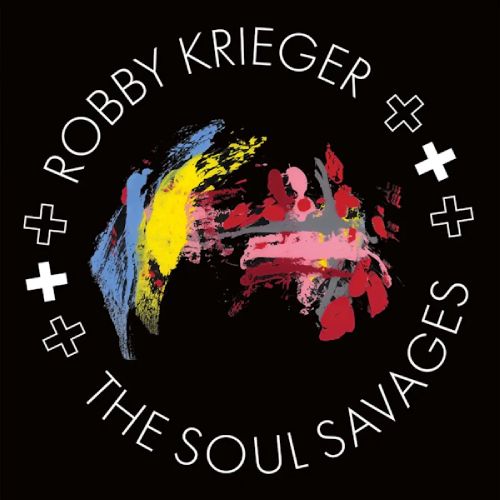
‘Robbie Krieger & The Soul Savages’ is out now on Mascot Records
www.mascotlabelgroup.com/collections/robby-krieger
www.facebook.com/OfficialRobbyKrieger
